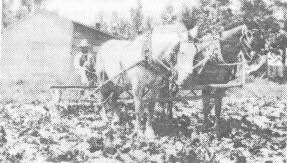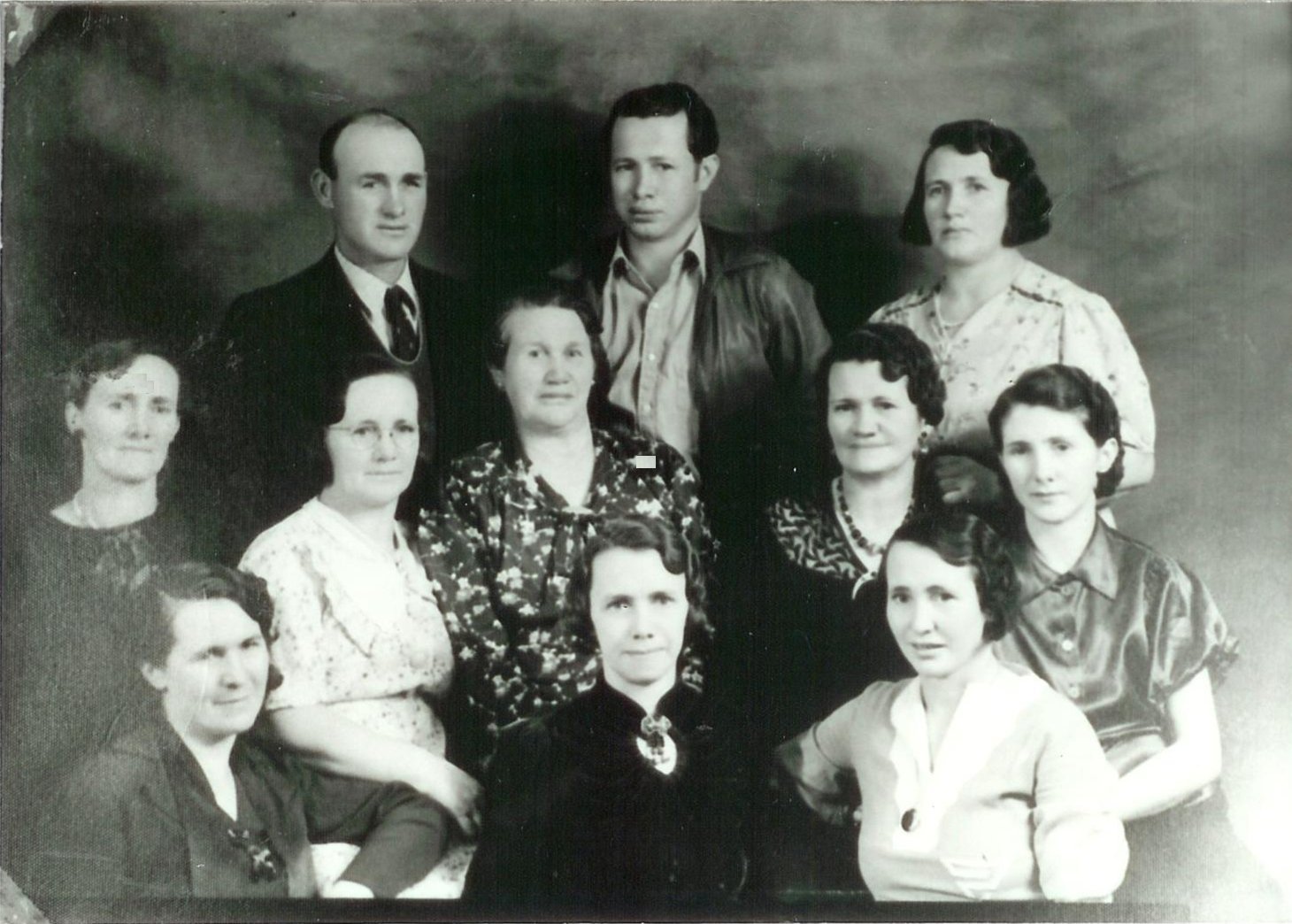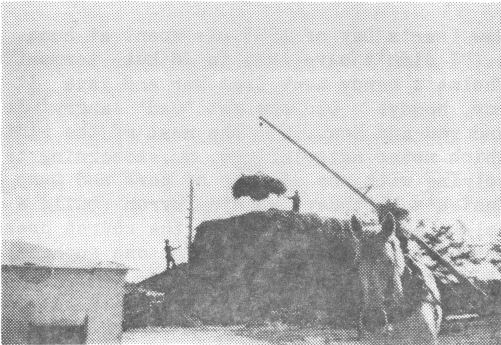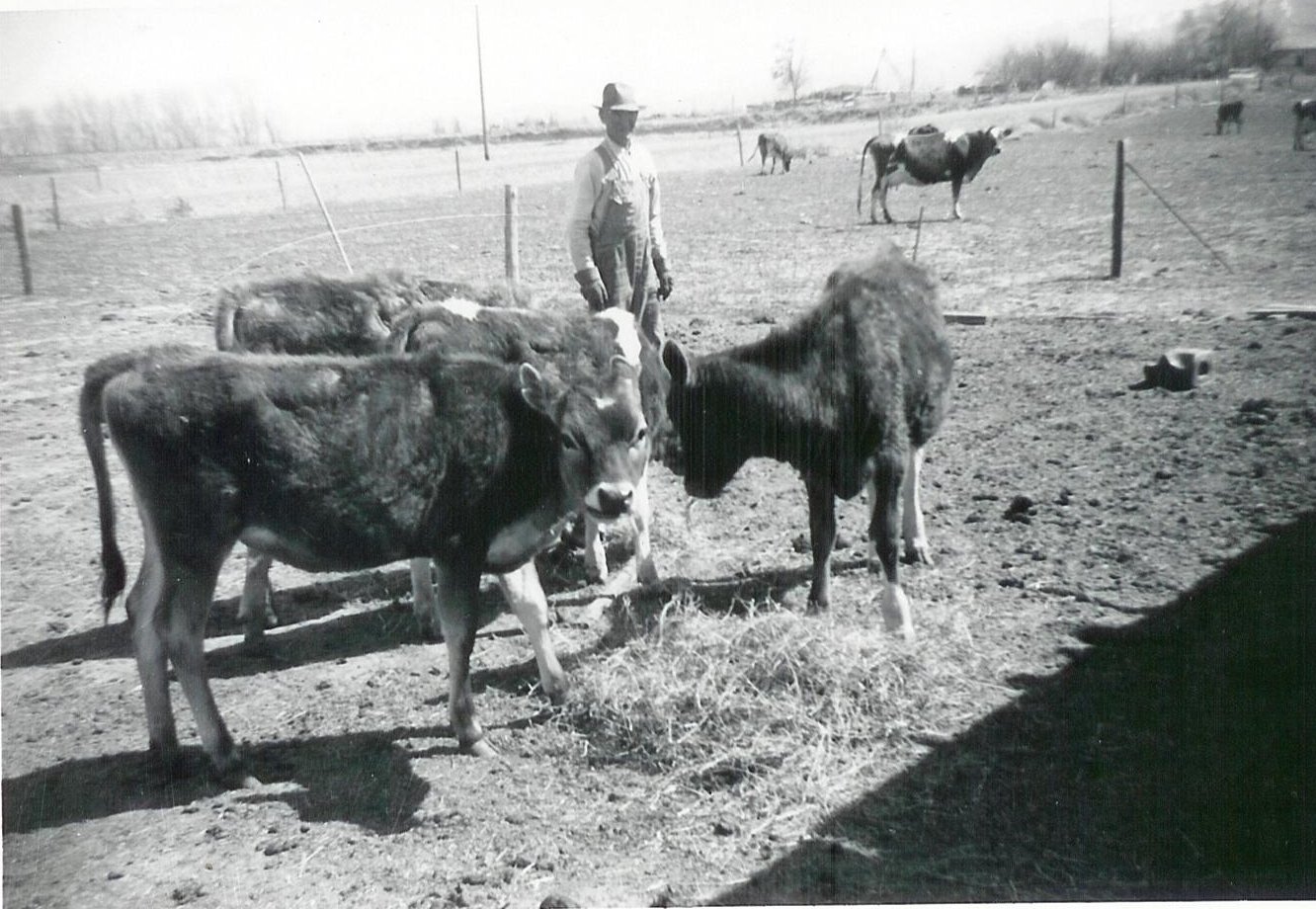Ira L. Frost
Chapter 6
1934 – 1936
Hard Work in Hard Times
The fall of 1934 was one
of hard work, with Ira picking potatoes, digging, topping, and
hauling his beets with the help of some hired toppers. His beet check
was for eighty-five tons from seven acres at four dollars per ton.
After expenses, there wasn't much left, but he did buy a much needed
suit for himself, which cost seventeen dollars and seventy five
cents; he had to get his shoes half-soled for the fourth time so they
would last a little longer. One time while taking a load of wheat to
Heyburn to trade for flour, he was using a trailer that was not
licensed, as he simply did not have the money to buy one. He was
picked up by an officer for not having the 1934 plate. This was late
November and the Stout family had been using the trailer all year and
had never been picked up, but Ira received a ticket on one of his
first trips and had to purchase a license, which would have to be
renewed the first of the year. This was just one example of the many
little unexpected expenditures that came along while he was trying to
budget and provide the necessities for his family.

Ira cultivating beets behind the house
with Gerald on his lapIra cultivating beets
behind the house with Gerald on his lap
This same fall, Eunice and Thelma had earned enough to allow them the luxury of their first permanent wave for their hair. This was, at that time, an all day event. When the family was finally ready to go home, it was dark and snowing. Approaching the Burley hill, the snow was so thick that visibility was zero. Ira stopped the car, but not before he had a collision with another vehicle and his own trailer. While he stayed to make needed repairs, the man in the other car took the family home. Ira, soon on his way, met Mr. Gooch and Vyla coming back to help him.
As the year 1934 drew to a close, the Frosts scraped together some money for Santa Claus. Vyla left Ira with Celia, Lorna, and Marian, who were all sick, while she went shopping. Then Thelma came home from school with a sore eye (one of her styes); they knew, as always, that Marian would soon have it also. In spite of all this, they had an enjoyable Christmas, with the items Ira was able to build and repair. Christmas was never complete without all of the family going to the Unity Ward Christmas Party where everyone received a sack of candy and nuts. On Christmas Day, Ira would take all the children to the Burley Theater, where the Elks provided a free movie and a sack of candy for every child. Each one guarded his candy and practically counted each piece and savored every morsel, making it last as long as possible. As the year drew to a close, Ira walked or caught rides to town almost every day to see if his name had come up to go to work.
New Year's Day of 1935
was spent at home. In Ira's diary it states: ..."I didn't have
much to do but torment mama and the girls. Took Thelma's candy away
from her and gave it to the little kids. And boy, howdy; Did she get
'mad' 'angry' and 'vexed'. Did she get green and red and how...."
The rest of the winter he was hoping for work which never
materialized, so, according to his diary, he kept busy helping with
the canning of pork and pumpkins, making ice cream for Eunice's
birthday, helping Myron build a box for his primary articles,
attended a drama at the church presented by the Pella Ward, and
attended his meetings. About one such leadership meeting, he said, "A
most interesting, enjoyable, and educational time with some of the
best speakers available." The late cold spring saw him trying to
get into the fields, and he helped Vyla when she had a terrible cough
and the flu. He also had a good visit from an old army buddy, George
Carpenter, and enjoyed talking over old times with him. He sold four
hogs for a total of twenty two dollars and ten cents and a Mr.
Pickett from Oakley paid him fifty dollars for pasture rental from
the previous summer.

The Chauncey Frost Family in 1935: Back row: Ira, Earl,
Christena. Middle: Nettie, Elva, Lonevie, Cora, Ruby.
Front: Faye, Florence, Pearl. (Chauncey died in 1930)
A little excitement in the spring of the year occurred when Mr. Gooch discovered a skeleton in his orchard!! Sheriff Pace was called to investigate and all the kids stood around in awe. It was determined that this man had been murdered and buried there a few years earlier. Along about the first of May, 1935, Ira had a telephone installed. Now the older children were beginning to get a little wise, and had noticed that their daddy would put a telephone in and soon afterward a new baby would be born; then the phone would be taken out again. Well, sure enough . . they were right; on a rainy night of May 30, 1935, at 2:30 a.m. a little black haired baby girl was born. Dr. Kelly delivered the baby and his fee was thirty-five dollars. The family was excited about the new little one, who they named Kathryn. Mother Dayley came out to help.
The Fourth of July was
celebrated eating homemade ice cream and a picnic with the Gooch
family. At night they watched the fireworks. On July 7, Ira gave the
new baby her name and a blessing. The Frosts worked hard the rest of
the summer in the beets and the other crops. Vyla went right back to
her old job of cutting and raking the hay while Ira and Myron shocked
it. Then it had to remain in the field until it cured (dried enough
so it would not rot in the stack). When hay hauling time came, the
hay was pitched onto the wagon drawn by a team of horses. The wagon
was driven down between the shocks with Myron pitching on one side
and Ira on the other. Usually one of the younger kids had to stay on
the wagon and "tromp". There was often a few kids perched
happily on the load as it arrived at the stack.
Ira (right) stacking hay and Myron (left) running the jackson fork. Old
Prince, the horse, lifted the fork of hay to the stack by the derrick.
One of the younger children is on the horse. The chicken coop is in the
bottom left corner.
It was a hot summer and many of those afternoons the kids, with the Gooch kids, would take a nice cool swim in the old canal. It was a great place to spend an afternoon diving from the bridge, then running down the bank a ways where they could dive off a board or jump in. There was nothing more refreshing or enjoyable. The Warner reunion was always held in August and an occasion everyone looked forward to. It was usually an all day affair, with lunch, visiting with relatives they hadn't seen for awhile, and games. After going home to do the chores, they often went back for an evening dance.
As school started on the first of September, 1935, it created a problem, as some of the children were being transferred to the Miller School. Ira went to see about keeping them all at the Southwest for convenience. On the way home, he had car trouble, which was just the excuse he needed to trade for a 1928 Dodge. However, three days later, he broke the gear shift and didn't have the money to get if fixed. He worked on it having it going by his birthday. Vyla coaxed him to go to town and when he returned, there was a big crowd of people at home who gave him a surprise party. There was a little something special for Thelma that fall, too. Ira and Vyla wanted to give their children as many advantages as possible, and so, bought her a violin from the Mannings for twelve dollars. They had previously bought a used piano and Eunice was learning to play it.
The beet harvest that
fall presented some difficulties due to the labor situation. First,
Ira was unable to hire a full crew, and when he did, some of them
failed to show up. Then they demanded a dollar a ton for topping (by
hand) rather than the seventy cents agreed upon. Ira refused and
finally won the labor dispute, and they decided to work for the lower
rate. They succeeded in finishing the harvest, but not before some
snow and freezing weather. 
Ira feeding his calves. (1954)
In December he started tearing down the old potato cellar up by the canal and salvaged the lumber. He attended a "Farmer's Banquet" sponsored by the Chamber of Commerce and he felt it to be a special occasion. The family, as usual, enjoyed Christmas, and had a dinner at Mother Frost's with most of the Aunts and Uncles present. A day or two after Christmas, the children went to the annual Primary Ward party, and in closing out the year, Ira mentioned paying his tithing, ward budget and fast offerings. It did not matter how difficult the times were, he always paid his offerings to the Lord.
The year of 1936 started with cold weather and blizzards. Ira was having mechanical difficulties with his car, so he traded for another one in January. Occasionally, the children missed the bus and Ira would drive them to school. Especially was it difficult to catch it this winter with some of the worst snow drifts they had seen. A three day blizzard left them snowed in for a week. Some of the drifts were as high as the haystack. The children had to walk in the snow to catch the bus at the main highway. Some of the younger ones had to be carried through the big drifts by Ira. The Stout family lived down the canal bank east of Gooch's. Their baby became ill, so Mr. Stout, Mr. Gooch, and Ira dug a path so the Doctor could get to their house. Ira's face was frost-bitten and sore for several days.
The family used the long winter evenings to good advantage by reading and making their own entertainment. Eunice and Thelma practiced their music and played duets. Ira commented that this pleased him, and they sounded good together. As the snow was melting, the rains came; consequently, there was flooding with as much as four feet of water along the road. The mumps hit most of the children in February and March, resulting in the family being quarantined. In those days, when a member of a family contacted a contagious disease, the county nurse would go to the home and post a sign stating: "Quarantined!" "Keep Out" then specified: Mumps, Measles, Chicken Pox, etc. There was to be no visitors and the family was not supposed to go out in public until the disease had run it's course. Then they had to obtain a permit for the children to get back into school.
The remainder of the
spring was normal farm work. Ira built a calf manger and a brooder
house for the chickens. He bought a mower and a manure spreader. The
spreader cost two hundred sixteen dollars of which he paid fifty
dollars down. He spent considerable time with a colt that was ready
to be "team trained". At this time, Ira was trying to make
arrangements to buy the place he was farming. He applied for a
federal loan and for his soldier's bonus.

Kathryn
This year, 1936, he was called to a special church assignment respecting the welfare needs of the ward members. The church contacted all members, seeking out those who were in need of assistance. Ira was given a portion of the ward to visit. It seems strange that he did not consider himself a welfare candidate, though their situation was often difficult.
Myron was becoming quite a helper on the farm, but this spring, he broke his arm while participating in a school track meet. Consequently, his effectiveness was temporarily diminished, adding still a heavier burden to Ira's shoulders. Eunice graduated from Junior Seminary this spring.
During the summer months the family spent many long laborious hours in the beet fields, thinning and hoeing. It was hard tedious work, but a job they knew had to be done, as a large portion of the family income depended on the beets. On the hottest days, they went out early in the morning and later in the evening to work, saving the heat of the day to relax or take a swim. They still found time to visit and have a few family outings and the Heyburn Pioneer celebration that summer was a special day. The apricot trees usually had a good crop of fruit, which the family always picked and sometimes sold, earning a little extra money. The cousins in town often stayed with the Frosts, and sometimes, Eunice and Thelma spent a day or two with Laura Warner or other cousins. In August, Jess Casper, the car salesman, convinced Ira it was time to trade cars again, and so once again, he made a trade.
Chapter 7